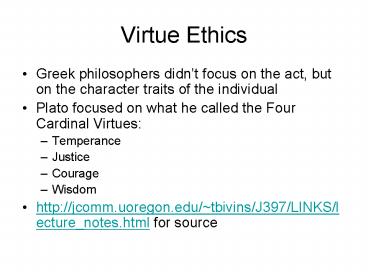Virtue Ethics - PowerPoint PPT Presentation
1 / 16
Title:
Virtue Ethics
Description:
http://jcomm.uoregon.edu/~tbivins/J397/LINKS/lecture_notes.html for source. Virtue Ethics. Aristotle called this concept the Golden Mean. Moral choice is always a ... – PowerPoint PPT presentation
Number of Views:67
Avg rating:3.0/5.0
Title: Virtue Ethics
1
Virtue Ethics
- Greek philosophers didnt focus on the act, but
on the character traits of the individual - Plato focused on what he called the Four Cardinal
Virtues - Temperance
- Justice
- Courage
- Wisdom
- http//jcomm.uoregon.edu/tbivins/J397/LINKS/lectu
re_notes.html for source
2
Virtue Ethics
- Aristotle called this concept the Golden Mean
- Moral choice is always a continuum
- Moral persons will gravitate toward a moral
mean, which somewhere between the extremes of
behavior (excessive and deficient)
3
Golden Mean
4
Virtue Ethics
- Useful?
- Doesnt give us a clear method to determine right
from wrong - Virtues can conflict should I be honest or
kind?
5
Chapter 2
6
Conventional Morality
- Purchasing Abroad story how would you deal
with this? - What if the company that you bought from, bought
from one of those countries? - What if the company you bought from, bought from
a company that bought from etc.? - Is morality a personal view or a shared view?
- Are rights and wrongs universal, cultural,
societal, family-oriented, or personal? - If shared, is a belief that our shared morality
is superior to other countries arrogant?
7
Ethical relativism
- In this view
- There are no inherent rights and wrongs
- When in Rome view
- No individual country or culture is superior
- The opposite of a universalistic view
8
Kohlbergs three levels of moral development
- Level 1 Preconventional level
- Stage one We react to punishment no sense of
right or wrong - Stage two We do things to get rewards and praise
- Level 2 Conventional level (where most people
never leave) - Stage one Good Boy/Nice Girl Morality we
react to expectations of others, we understand
the norms - Stage two Law and Order stage conformity with
societal roles and rules - Levels 1 and 2 are driven by external influences
9
Kohlbergs three levels of moral development
- Level 3 Postconventional level
- We know why things are right and wrong
- We can reason why theyre right/wrong
- Stage one
- Contract and individual rights
- Stage two
- We can give a rational defense of our guiding
principles - We dont do things because others tell us, but
through rational decision-making - Level 3 is internal
10
Right and Wrong
- Judgments of right and wrong often involve
- Moral decisions as universal
- Moral judgments as important
- More important than our personal needs or even
legal requirements - Praise and blame based on moral decisions
11
Subjective and objective morality
- What is the difference between a subjectively
correct/incorrect moral decision and an
objectively correct/incorrect moral decision? - Subjectively correct means we believe were right
- Objectively correct means were adhering to moral
laws and norms - We usually dont deal with the beliefs of the
participants, only the actions - Because of this confusion, many feel all moral
questions are subjective
12
Normative ethical relativism
13
Normative Ethical RelativismThree types
- There is no absolute right or wrong, just
opinions - What are implications when right and wrong is
about individual feelings and not objective
behaviors? - If you cant disagree with an opinion, everyones
always right, so - There is an absolute right or wrong, but it is
determined by the culture - What are the implications here?
- We should not judge things as right or wrong
because theres no way to know - Implications?
- Is it worth investigating why something is
right or wrong? - Search for agreement?
14
Moral Absolutism
- The opposite of moral relativism
- Moral behaviors as external and universal
- That doesnt necessarily mean we can know what
they are - This book contends that there is an ideal we
can strive towards, but it isnt necessarily
external or universal - This is neither relativism or absolutism,
according to the author
15
Conventional Morality
- Morality must be shared to a great extent, if it
is to have any purpose in a society - Particularly in a pluralistic society like ours.
- While differences exist, nations share some basic
moral values (murder, lying, respect for
property) - National sovereignty limits what can be done
- When in Rome, do like the Romans what about
this? - Some adherence is obvious traffic laws example
- What about norms that go against our basic
beliefs? - Further, can we, should we, or must we IMPOSE our
morality on others?
16
Two basic approaches to moral reasoning
- Teleological approach
- Based on consequences, ends consequentialism
utilitarianism - Jeremy Bentham and John Stuart Mill
- Deontological approach
- Based on the notion that things are inherently
right or wrong, and the situation/consequences
are irrelevant - Judeo-Christian approach is deontological
- Kant
- What most discussions of business ethics, social
ethics use - Moral imagination is required (cognitive
complexity)































